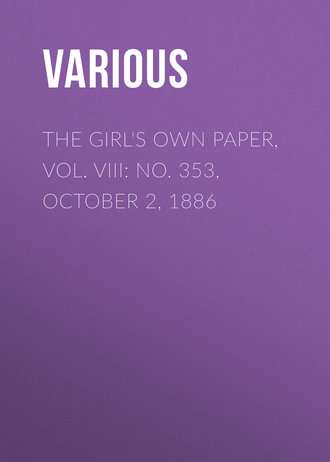 полная версия
полная версияThe Girl's Own Paper, Vol. VIII: No. 353, October 2, 1886
The embroidery is used for table-cloths, mantel borders, and curtain brackets, knitting bags, handkerchief cases, and as a trimming to evening dresses. In all cases it requires a silk lining, and should be worked with a muslin lining beneath it. Embroidering Breton handkerchiefs is not a new description of fancy work, but it is still in vogue; and when a lady has had sufficient patience to successfully accomplish the feat of covering every portion of the handkerchief with thick filoselle work, there is no doubt that she has produced a piece of embroidery not only handsome and durable, but that will justly hand her name down to posterity as a real worker, and not one who takes up the whim of the hour and throws it on one side as soon as it bores her. The squares made of these embroidered handkerchiefs are shown more effectually when they are lined with quilted silk and used as banner-screens than when they are bordered with wide plush and used as table-cloths. The pattern in the latter case is never seen as a whole, and the beauty of the work is often marred by water from flower vases spilt over it, or wet teacups and saucers put down on it. The small screens now so fashionable make another admirable place for mounting Breton work. These screens are made of two compartments only, in height about 4½ feet. To each panel, 2½ feet from the ground, a ledge that can be put up or down is fixed, and that is used for holding a book or a teacup. The panel below this ledge is merely filled with a little curtain made of coloured Oriental silk, and arranged in very full folds. The panel above the ledge, that is fully displayed to every eye, is filled with the embroidery stretched quite tightly across it and displayed to its full advantage. The back of the embroidery is concealed with a satin or silk matching the little curtain beneath. Two Breton handkerchiefs are required, one for each division, but they should not be selected both of the same design. The little screens are made of oak, mahogany, and ebonised wood. They are a simple framework, an inch and a half square, and any working carpenter would make them to order.
Breton embroidery is too laborious for many people, and those whose time is much occupied with household matters, and who cannot devote much of it to the task of making their drawing-rooms pretty, we recommend to try crazy patchwork in its place. We have lately seen this easy work carried out most successfully, and used as mantel and table borders, covers for footstools, and as the centres of small table-cloths. The work is one of the least expensive that can be tried, and can be put down without derangement of effect at any moment (a great point in its favour where interruptions are frequent). Before commencing any piece of it, it is better to accumulate all the oddments of ribbons, plush, velvet, silk, and satin lying in the piece-drawer from dress trimmings or sent as patterns from shops. The more plush and velvet obtainable, the greater the effect produced, while the colouring should be of a vivid tone, but excluding the bright aniline dyes already once referred to as being unsuitable to blend with other shades. A strong piece of ticking is required for the foundation, and on this the pieces are arranged. They should be pinned on while the amalgamation of colouring is being tried, and, when that is settled, basted on to the lining, the edges of soft materials being turned under and secured with the basting lines. Similarity in shape and size is to be avoided when placing the pieces, and the effect aimed at that of the colouring of a kaleidoscope in its variety and brightness. In order to obtain queer shapes and corners, it is not necessary to carefully cut them out and fit them into their various spaces; in fact, it is better not to do so, but to lay one material partly over another, and by so doing make the desired form. The embroidery is generally left until the pieces are basted down to the lining, but now and again the scraps should be embroidered before they are fixed down, this method being the least troublesome when fine silk work is attempted, such as working flowers in shades of colour or intricate designs, or following out the lines of stamped velvet or brocade with couched-down cords and gold thread. Thin Oriental silks require a thin muslin lining underneath them, and the embroidery executed before they are tacked to the ticking, as unless this precaution is taken they are apt to pucker and look uneven and poor. When the patchwork scraps are all arranged, spare strands of filoselle of any shades are used to cover over the basting threads with lines of coral stitch, feather, chain, rope, and herringbone, while oddments of silk cord, Japanese gold thread, very fine braids, etc., are sewn down either as borderings to the securing lines or as forming designs and figures on the patches themselves. Embroidery stitches of all kinds are used to fill in the centres of the patches, and advantage is always taken of any pattern on the patches either by filling it in entirely with shaded silks, filling up its background with stars, crosses, or dots, or by enclosing it within diagonal lines, or sewing spangles down so as to cover it over. Every effort is made to enrich the patches by the use of gold thread, spangles, gold lace, and silk cords, and when the work is faithfully done, no one could guess it was devised out of oddments and produced at a nominal cost.
B. C. Saward.ROMANCE
FOR VIOLIN AND PIANOFORTEProfessor Sir G. A. MacfarrenListen | View/Download Lilypond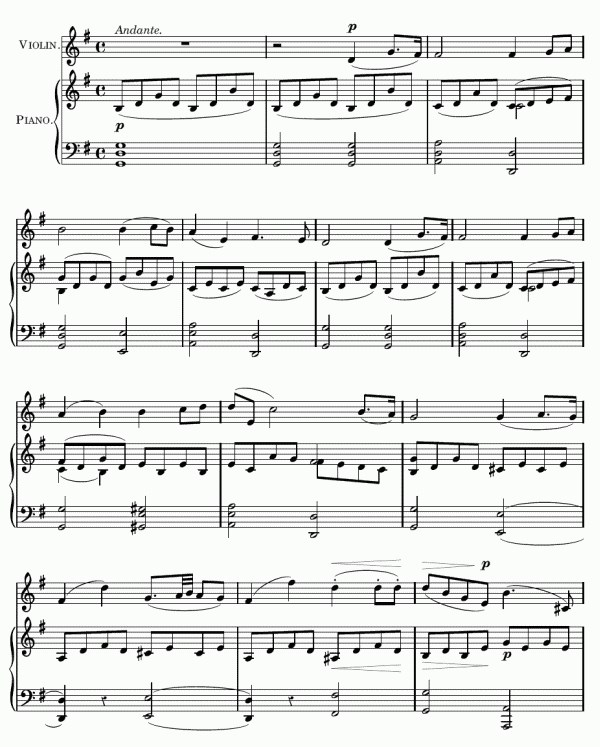
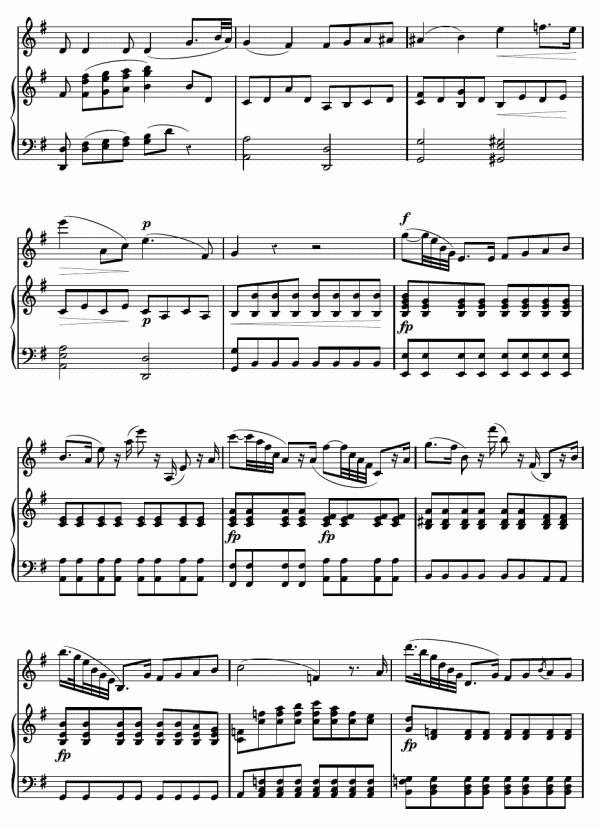
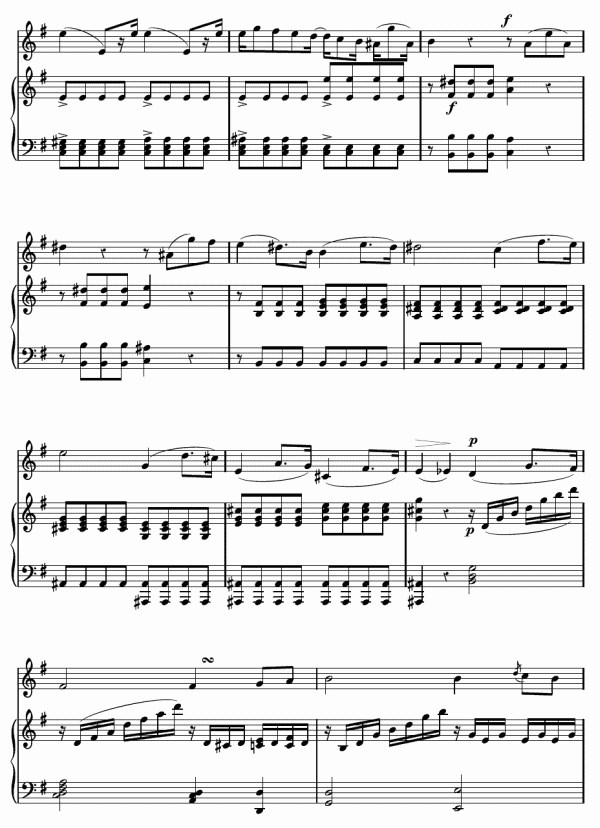
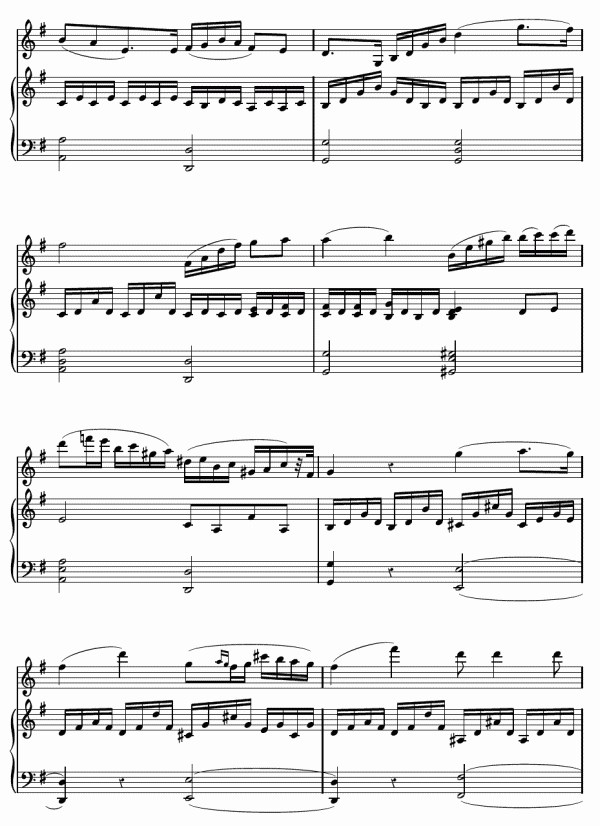
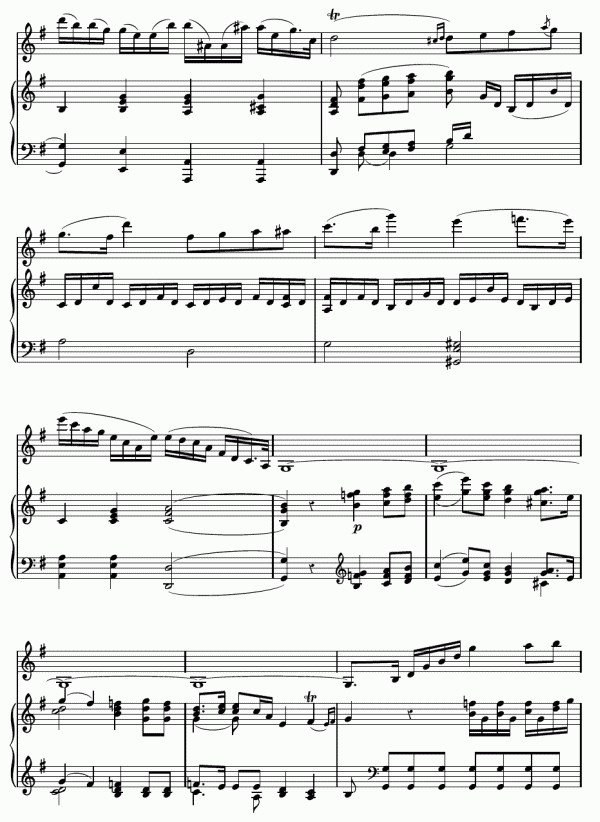
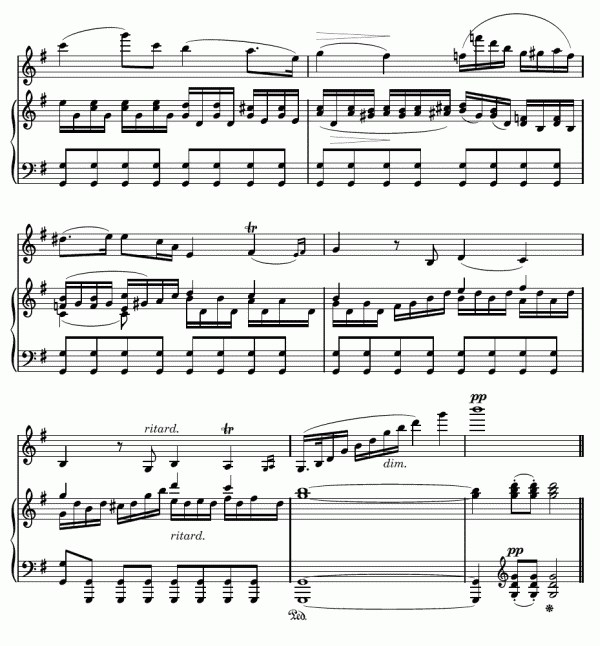
ANSWERS TO CORRESPONDENTS
EDUCATIONALA. Z.—The part of a whole made by two-thirds of three-fourths is one-half. Such books as those you name are not so appropriate for young girls as very desirable, instructive, as well as interesting books, although a girl of twenty-one might read one of such a kind once in a way. There is an article by Dr. Green in the last two numbers of the Leisure Hour (published by the Religious Tract Society, 56, Paternoster-row, London, E.C.), those for April and May, in which such books as you require are recommended—history, biography, travels, archæology, geology, astronomy; Shakespeare, Milton, Elizabeth Barret Browning, Longfellow, Tennyson, etc. Such books should occupy all your leisure for reading, besides the study of household economy, nursing, cookery, needlework, and cutting out. The first five years after leaving the school-room should be devoted to such studies as these, not wasted on the class of literature you specify.
G. H. T.—Yes, there is a Kindergarten College and Practising School established by the British and Foreign School Society. It is at 21, Stockwell-road, S.W., and it is directed by the Misses Crombie. There are ten such schools in London and eight in the provinces. Write for papers, and all information will be supplied you direct from that or any of the other schools. Had you given your address we could have given that which is the nearest to you. We think your age would be suitable. The answer you receive as to terms may decide you as to the way in which your £20 may be required. Perhaps if you annoyed your cousin she would not allow you to return home to sleep. Whether you could do so as well as board at the college we could not say. "Look well before you leap."
ARTSheltie.—To ornament ginger jars, or any kind of earthenware, without knowing how to draw or paint, first size it with ordinary glue-size, melted over the fire; then cut bright scraps of chintz, or gaily-painted cottons, into diamonds, squares, half-circles, triangles, etc., and paste them to the jars, carefully covering every part of the jar with the scraps laid closely together, but without making any set design. Let the paste dry; then size the jar, and varnish with white hard varnish.
Fleur des Alpes.—We fear there are no chances of a sale in London, as the market for screen and fan painting is already so full. Besides, you should take such work personally to shops and obtain trade orders. Would it not be wiser and more easy to dispose of them at Geneva, which is within your reach? Accept our best wishes.
Would-be Photographer.—The reason that the object to be taken appears upside down in the camera is this. Light travels in straight lines, and rays coming through little crevices (such as are used in cameras), cross each other, and become inverted.
MISCELLANEOUSEffie.—The texts of Holy Scripture which you cannot find are to be found as follows:—Psalm xciv. 22, and Gen. xvii. 8; Exodus xxix. 45; Ezekiel xi. 20; Zechariah viii. 8; 2 Cor. vi. 16; Rev. xxi. 3, and in other places. Your "Concordance" must be a very bad one. Your handwriting is not formed, but promises well.
Gowan Cobban.—We do not recommend publishers to our correspondents. All three specimens of writing are legible, but No. 2 is careless and unfinished. Why write a small "b" for a "v"? The latter has no tall upper stroke.
E. M.—The health of bride, bridegroom, bridesmaids, and respective parents of the newly-married pair is drunk, but no others, as a rule.
Corisande.—We could not possibly assist you in carrying out or devising a method of revenge on the wrong-doer, nor do we think that even the aggrieved parents of the injured friend would approve of the plan. If you reprobate an ill-bred action, you cannot, consistently with your own views of what is seemly and dignified, punish that action by following suit, and doing what would be ill-bred yourself. Besides, as a Christian, read Romans xii. 19.
Una Mildred Hitchings (N.Z).—The 14th of February, 1809, was a Tuesday. Many thanks for your nice letter.
E. B. P. we think had better take more exercise, and avoid late suppers and sitting up late, as it seems probable her digestion is weak.
Sepia.—Hairpins are not injurious to the hair except when the hair is too tightly put up, when that certainly affects the nerves. We think young people, as a rule, do not require stimulants unless under the doctor's orders. We think oils are far easier to use than water-colours.
Morning Dewdrop.—We do not think the poetry worth much now, but it shows that at fifteen you are thinking about good things in preference to evil and idle things, and so we consider writing poetry, in many cases, a good amusement.
Queenie Foster should return the duplicate copy and ask for the right one, and if enclosing stamps, as the surest way of getting it, she can retain the duplicate.
An Unhappy One should not marry her widower on any account, if she feels as unhappy as her letter portrays. She must not grow discouraged too soon, but cultivate patience, and never minding. And should she finally undertake the care of a ready-made family, she must be brave and courteous, not rendering railing for railing, but, contrariwise, blessing. Be not overcome of evil, but overcome evil with good.
Hawthorn.—We know of nothing better than your present treatment. We are much obliged by your kind offer, but we do not require any at present.
Idonea.—We should think your digestion was out of order. Read the advice given by Medicus to "Working Girls," page 295, vol. vi.
Mysotis.—Your nationality is that of your father, but you may adopt a country; and if he be naturalised English, you become English too, or you may legally become so yourself. Also, if you marry an Englishman you become an Englishwoman, without going through the process of naturalisation. Of course by blood you are half English, through your maternal descent.
Ophelia.—We feel for "Ophelia" very sincerely; but she should rouse herself, and not give way to morbid brooding over her troubles. Has she no sacred duties to perform to those around her? No Lord and Master above to serve and glorify, by submission to His dispensations? Has she no blessed hope of a life beyond the grave? We could not insert your verses. "All else" is not "gone," whoever was removed, when you have "one that sticketh closer than a brother" to lean upon. Read St. John xiv.; indeed, you had better study the whole Gospel, and set yourself resolutely to devote yourself to others.
May Elwin.—Our publisher, Mr. Tarn, sent us your letter. We suppose you thought him the editor. The writer of the poems you name is not one with whom we are acquainted.
Myself.—We cannot do better than refer you to the abuses of the Lord's supper, to which St. Paul alludes in 1 Cor. ii. 21, 22, which answers your question. Also see Hebrews x. 25, and 1 Cor. xiv. 40. Beware how you trifle with sacred rites and sacraments. You had better look up the whole of the text about Elders and their office in the New Testament Epistles. Our Lord's promise is that where two or three are gathered together He would be in their midst and bless them. You had better look out the word communion in the dictionary, as it cannot refer to one person alone; it is an act performed by a certain number of persons together, more or less. Again, when the clergyman prays for his congregation, is he not a mediator? And when you and your friends pray for each other, are you not mediators? And this, without disparagement to the doctrine that Christ is the great and chief Mediator, without whose divine mediation all other would be useless.
Brunette.—The soul does not attain its highest state of bliss until it be re-united to the body; but the soul of a believer in Christ (by which we mean one of His faithful people, who loves, serves, and trusts in Him and His atonement alone) will enter into a happy and sinless rest. He has made "an everlasting covenant with them," not with those who deny Him. Any mercy shown to such would be uncovenanted. See for yourself what the Scriptures say. We know nothing more than what is revealed in them. As to the heathen who have not heard the Gospel, they are "a law unto themselves," and will be judged as such, not as those who rejected Christ.
One Wanting To Learn.—We are glad that you find the Sulhampstead Question Society, which we recommended, so useful in helping forward your education. We do not print our correspondents' letters.
Roy.—We regret that we cannot accede to your request. It would interfere with the general usefulness of our magazine if we were to introduce the subject of politics into it. We do not even discuss vexed questions of religious belief, because our paper is meant for persons of all denominations, whose feelings should be respected. We limit our teaching to the broad principles of our common Christianity.
Lottie.—If in so feeble a state of health, you should obtain medical advice. We could not prescribe for a perfect stranger.
June.—All the chief writers of this paper, with the artists and musical composers, including ourselves, have already been represented, in a more or less satisfactory manner. The story, "That Aggravating Schoolgirl," appeared in the second volume, beginning at page 9.
M. C. F.—We do not quite understand what you mean. Visiting cards should never be sent by post, and if they be left at the house you acknowledge them by calling in return. If people be at a distance from you, you must take an opportunity of calling when near. You must answer congratulations either by letter or a call.
Birchbroom.—St. Paul was a bachelor, and tells you so in 1 Cor. vii. You will find many pretty designs for knitting in our paper. We do not propose to keep any space specially for knitting recipes. You will find one for a petticoat at page 41, vol. ii., in the number for October, 1880.
Nellica.—We thank you for your kind and grateful letter, and rejoice that you enjoy our paper and are allowed to read it. You write a very fair, legible handwriting.
A Hothouse Plant.—Pampas grass must be bleached in a solution of chloride of lime. You had better consult the chemist of whom you procure the drug as to the proportion of water. Perhaps he would prepare it for you. You write well, but use a bad pen—we mean an old, worn-out one.
Bedwaeen (Hyderabad).—We acknowledge your kind letter with our best wishes and thanks. You do not ask any special question; but as you regret a want of acquaintance with the rules of English grammar, we recommend "The Handbook of the English Tongue," by Dr. Angus, published at our office, 56, Paternoster-row, E.C.; address Mr. Tarn.
Amelia should take her "twopenny mulready envelope" to a shop where stamps are sold for collections. This is the only plan, if not disposed of to a private collector. We do not think she will make very much on the sale.
The Bird.—Kindly refer to the article in question, where all information is already given.
Ormonde should call after all invitations, whether she accept them or not.
Lily Walker.—The bridegroom presents the bride and bridesmaids with their bouquets; but it is not needful that the latter should have them. The health of the bride and bridegroom respectively are proposed by the oldest friend of the family present; but other healths are no longer drunk as a universal rule, we believe.
Italia.—The competition papers are in no case returned. Your quotation is very good, but is useless under the circumstances.
Dulcie Weston should consult a doctor and take a tonic. We should decidedly object to cold baths in her case. They should be rather warmer than tepid.
Dewdrop.—When the right time comes for the hatching of silkworms, they should be kept in the sun. Before that they should be kept cool, as their coming out should be delayed until that of the new mulberry leaves. The worms need not to be kept in the sun.
Bluebell and Dolly.—Many thanks for your kind letter.
Mayflower.—We should think, from the price you name, that you are buying spirits of wine. Send your own bottle to an oilshop for methylated spirits. But why not do this:—Get a small oil-lamp and kettle, enough to boil a quart of water; when quite boiling it will be enough for two gallons of cold water, and, using a sponge bath, you can have a comfortable bath?
Grace should wear the backboard and faceboard, so often recommended by us, for an hour every day while reading or learning her lessons. The book could be set on a stand or shelf, and she could learn while walking to and fro.
Guelder Rose.—Some words and names have been given an arbitrary pronunciation by that tyrant—the fashion of the day. There is a rule for each class of society, by which all within those respective circles is bound, unless its members wish to make themselves remarkable. Amongst the "Upper Ten" the name Derby is pronounced "Darby," Shrewsbury as "Shrowsbury," and clerk as "clark." Balmoral is "Bal-moral," the "mo" chiefly accentuated. Writing fairly good.
Try Again is thanked for her kind letter. That a competitor should not be successful is no discredit to her work, because the number of papers sent in is so enormous, none but the most remarkably perfect amongst the good ones can be awarded even certificates, not to say prizes.
Coming thro' the Rye.—You form your letters fairly well, but reverse the heavy and light strokes. The down strokes should be heavy, and the up strokes light. Also, if you did not make the ends of your final letters in every word turn up like pig-tails, your writing would be improved. Perhaps your handwriting may be formed, or begin to be so, at sixteen. No children write running hands.
Rose.—No "gentlemen" presume to speak to girls in their own rank of life without an introduction; it would be an insult. And as to proposing to walk with you, as a stranger, if you have no father, brother, nor uncle to warn him away, he deserves to be handed over to the police. But men do not usually take such liberties unless they have had some encouragement. Beware of looking at strange men in passing them. Look away when they come near.
Edith.—Sage tea is good for cooling the face and healing the skin when much sunburnt; but it should be used the same day. Lie on a sofa, and lay the wet leaves over your face.
AUTUMN
By HELEN MARION BURNSIDE The chestnut burrs are falling On the shining dew-steeped lawn, Where the swallows have been calling To each other since the dawn; For again the forest leaves, And the upland's crown of sheaves,Wear the fair pathetic glory, which so quickly is withdrawn. And a youthful pair goes straying, As we used to do of old, With the sunlight on them playing, Through the elm trees' paling gold; And I wonder as they go, Pacing slowly to and fro,Are they telling one another just such secrets as we told? In the cool and fragrant dunlight Of the woodlands, wet with dew, Looking out towards the sunlight Here I stand—but where are you? Where are summer's lusty leaves, Where the swallows from the eaves,And the hopes, and dreams, and longings that in those old days we knew? Many a spring has blossomed brightly On the grave of a dead past, Many a summer has tossed lightly Her cast leaves upon the blast; And as autumn fades away Into winter's quiet grey,Comes the hope: eternal springtide will give back my friend at last!








